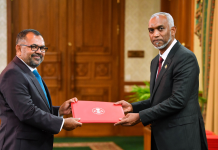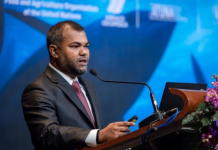Former Finance Minister Ibrahim Ameer has raised critical questions concerning President Dr. Muizzu’s assertion that his administration has successfully settled MVR 13 billion in debt within a span of seven months. This declaration was made by President Muizzu during the inauguration of the People’s National Congress (PNC)’s primary campaign site, “PNC House,” on Sunday evening.
President Muizzu proudly announced that the government had cleared MVR 13 billion in debts owed to both foreign and domestic entities. This news was significant, considering the substantial financial burden inherited from previous administrations. However, Ameer quickly responded on the social media platform ‘X’, challenging the feasibility of such a large-scale debt repayment within such a short period.
ކަނޑައެޅިގެން އޮޅުވާލައިގެން ދައްކާ ވާހަކައެއް. ނޮވެމްބަރު 2023 ނިމުނުއިރު އެސް.ޑީ.އެފް ގައި ޑޮލަރުން 141.1 މިލިއަން ހުންނާނެ.
– އެމް.އެމް.އޭ ގައި ޑޮލަރު އެކައުންޓުގައި ކޭޝް ބެލެންސް: 2$ މިލިއަން
-ފިކްސްޑް ޑިޕޮސިޓް (ކޮމާޝަލް ބޭންކް) އަދި ޑޮލަރު ޓީ-ބިލް އިންވެސްޓްމެންޓްގެ… https://t.co/3QZ1LYgdPq pic.twitter.com/GjMp64SQF5— Ibrahim Ameer (@iameeru) June 24, 2024
Ameer highlighted a critical point: according to the Finance Ministry’s statistics, the state has spent MVR 18 billion from the budget so far this year. Of this amount, MVR 5 billion has been allocated for salaries. This leaves MVR 13 billion, which, according to Muizzu, has been used entirely to settle debts.
Ameer’s argument revolves around the practical implications of these numbers. He questioned how the government could sustain other operational costs if the entire remaining budget was allocated to debt repayment. Specifically, he mentioned the expenditures on new offices, the purchase of drones, and travel expenses for the president and his Cabinet. If these activities indeed took place, Ameer suggests it is unlikely that all MVR 13 billion was spent exclusively on debt.
Ameer pointed out that MVR 200 million has been spent on administrative and operational expenses alone this year. Furthermore, there has been a notable increase of MVR 600 million in operational expenses and salaries since Muizzu took office. The surge in political posts from 700 to 2,000 further contributes to the rising expenditure, which, according to Ameer, contradicts the president’s claims of cost-saving measures.
These figures suggest a significant discrepancy, leading Ameer to question the administration’s financial transparency. He challenges the claim that MVR 13 billion could be settled on debts while also covering these substantial operational costs.
In response, President Muizzu highlighted his administration’s achievements, stating that they managed to repay MVR 2.7 billion without resorting to high-interest loans or issuing additional currency. He also mentioned that his administration has paid MVR 4 billion out of the MVR 9 billion in unpaid dues from services commissioned by previous administrations. Additionally, the president announced a remarkable increase in the sovereign fund, which grew from USD 2 million to USD 54 million within seven months, with ambitions to reach USD 100 million by year’s end.
President Muizzu also noted that his decision to stop issuing additional currency notes has garnered positive feedback from international financial institutions, which may hint at increased financial stability and confidence in his administration’s economic policies.
As the debate continues, Ameer’s scrutiny brings to light essential questions about the government’s fiscal management and transparency. The significant claims of debt repayment, juxtaposed with the evident operational expenditures, create a complex narrative that warrants further examination to ensure clarity and accountability in the government’s financial affairs.


















